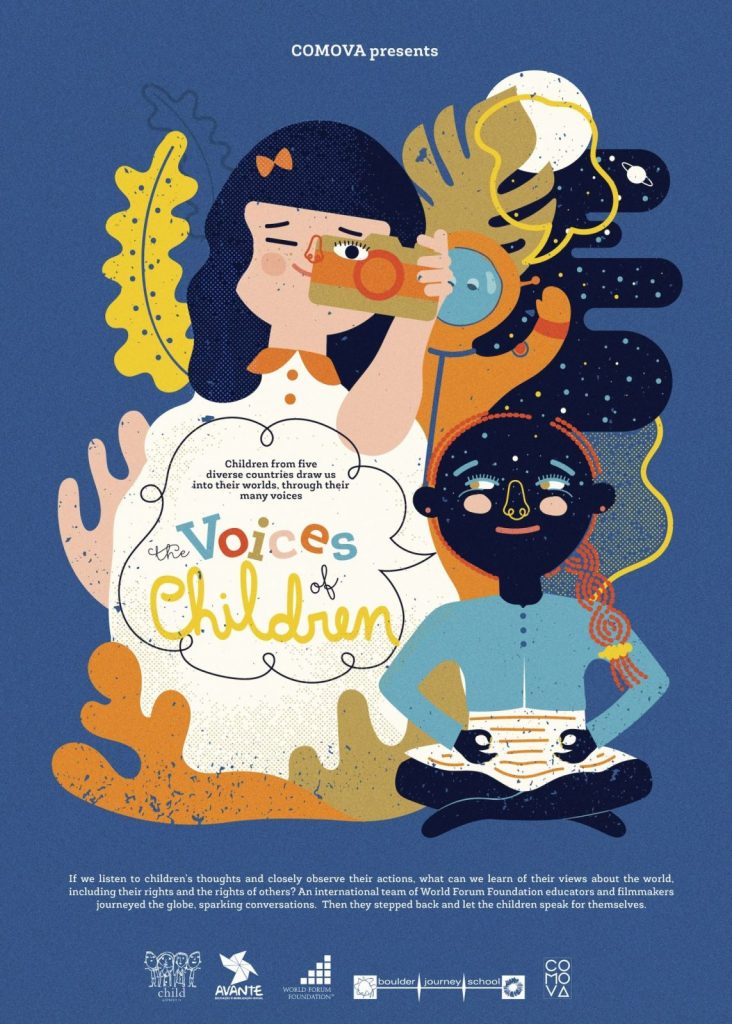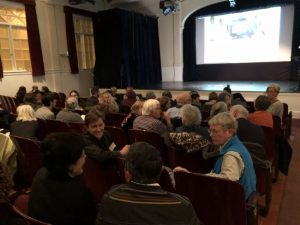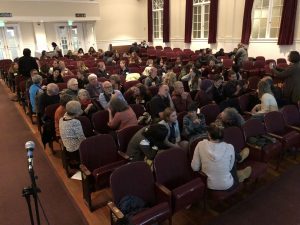
A Conversation on Children’s Rights
On November 20th, 1989, the UN General assembly adopted the Convention of the Rights of the Child treaty. 28 years later, The World Forum Foundation revisits this treaty with the creation of a powerful documentary designed to advocate for a more inclusive view of children’s rights from the perspective of the children themselves.
Hilltop Educator Institute collaborates regularly with speakers across North America, Europe and New Zealand to provide professional development opportunities in Greater Seattle through evening and full day workshops known as the Educator Discussion Series (EDS). The Hilltop Educator Institute provides resources and support to educators, programs leaders, children’s advocates, and the community at large, in order to widen access and opportunity for all children. To study at Hilltop for a day, register for upcoming workshops, or learn more about our services, email institute@hilltopcc.org or visit us at www.hilltopcc.com/institute
———
After a recent string of policy changes in the US which affect children, the establishment of the long-awaited children’s commission for the city of Hong Kong to protect children’s rights, and the atrocities we have seen around the world including the use of child soldiers in Syria and Myanmar, this month, Hilltop Educator Institute and members of the community gathered for An Evening Dialogue About Children’s Rights.
“Children have the right to be recognized…as both source and constructors of their experience…with an extraordinary wealth of inborn abilities and potential, strength, and creativity.”
– Reggio Emilia statement on the Rights of Children
On Friday, December 8th, educators, politicians, school administrators, children’s advocates and business leaders from Portland, OR, Greater Seattle, and Vancouver, Canada gathered at Rainier Arts Center in Rainier Valley to view The Voices of Children, a short documentary about what we can learn from children’s views about their world, if we listen to children’s ideas and closely observe their work and play. Facilitated by co-creator of the film, John Nimmo, the film screening and dialogue brought together a large and varied cohort of people concerned for the welfare of children.
Following the viewing of the documentary – which will become available for download from the World Forum Foundation website in late summer 2018 – we engaged in dialogue about what it looks like to honor children’s fundamental rights from their own perspective, and how we can help others in the community understand and apply the Voices of Children lens to ensure that children’s voices are heard.
One of the big questions which arose from the discussion, was the relationship between Child Protection and Child Participation, and how we might effectively come to understand children’s views of the world Furthermore, participants questioned how we can promote children’s meaningful participation in society, recognize the value of their experiences, views and concerns, and support them to enact change in the world.
For some, the authenticity of this film made it clear that far too often, children are viewed as dependent, and unable to help themselves. Messages from some humanitarian groups portray children as powerless and completely dependent upon the help of affluent benefactors. In the film, we saw children from five countries (Brazil, Singapore, India, Kenya, and the United States) displaying tremendous capacity and resilience, across a wide range of settings and circumstances Children throughout the film are seen embracing risks, which look quite different in their distinct contexts, and are seen negotiating and problem-solving without the intervention of adults. Children’s capacity to negotiate risks and challenges, and navigate their way through and around them, is an aspect of life that we don’t always respect.
“I think we have come to the mindset in the US that we must protect children at all cost. This includes smothering them and protecting them from every bump and bruise and injustice in the world. But the more I deal with children, listening to their thoughts, giving them the platform to express themselves, the more I see that they are more than capable, and more times than not, more capable of creating systems for dealing with injustices than adults. Imagine what we can learn, imagine how many lives we can change, imagine how many people could not just ‘make ends meet’, but actually thrive if we take the time to give children adequate support, sufficient information and the ways and means to express themselves so that they feel valued and respected as a contributing member to society” – Michael Browne, event organizer.
Chauntae, a Hilltop educator and student of John Nimmo offered this reflection:
“In the video, there were children who took off their shoes and ran down a gravel road, exclaiming with pure joy, “We are running barefoot!” This moment resonated with me because in my classroom, this is a moment that displays the desires of many of the children that I work with. I often find myself caught in the tension between a child wanting to make a decision about their outerwear and their parents having a different idea about the clothing requirements for outdoor play. The kids in my classroom repeatedly make comments, regardless of the outdoor temperature, to inform the adults that, “I want to be cold” or “my feet feel good on the ground.” These comments are often met with their parents wanting them to be bundled up and ready for 20-degree weather. I find myself now idling in the tension of respecting children’s rights to make their own decisions and respecting the rights that their parents have as their legal guardians. This is an idea that has brought up many questions for me, but the one surfacing most is, “how can I help the children advocate for their desires and rights?” I will be taking the joy the children in the video displayed as they were running barefoot back to my school community with the desire to put aside my own ideas and listen more intently to what children want and why. The why piece is what allows us to gather information necessary to help children advocate for themselves. I often advocate for the children directly to their parents and I am now challenging this within myself- Why am I not encouraging and supporting children to stand up for themselves when they may disagree with their parents? In light of viewing children as capable and competent, I must believe that they are able to make decisions regarding their bodies and also that they are able to advocate to their parents regarding the choices they want to make about their bodies.”
Sarah Felstiner, Curiculum Director at Hilltop Children’s Center, added:
“While the film was only 24 minutes long, it felt much longer, because we were so immersed in the children’s worlds. John’s introduction to the film helped set it in the context of the UN charter on children’s rights, specifically children’s right to “participation,” which I found very compelling. The scenes in the film are very specific – it’s not meant to represent “the state of children around the world” but rather dips its toe into particular places and stories, as a provocation for thinking about the rights of children. There are some very intentional and effective edits in the film, which quietly point out both similarities and contrasts between the settings. The best thing about the film, in my opinion, is that there are NO adults talking about children…it truly honors and shares the children’s voices. Also, I appreciated that the filmmakers were transparent with the children about their presence and purpose, entering classrooms, homes, parks and neighborhoods with their cameras and microphones, and in many cases turning those cameras over to the children. It is a very striking, moving, important film.”
 As the night drew to a close, we concluded by acknowledging that children are not the cause of any of the world’s problems, be it poverty, political instability, insufficient educational resources / systems, or security and well-being. Adults have created these problems, and enacted policies and measures that perpetuate them. If we give children the chance to share their ideas with others, and to have them taken seriously, we may in fact help them to create a society that respects everyone’s rights, empower them to challenge abuses, and mobilize a worldwide commitment to listen closely and intently to “The Voices of Children.”
As the night drew to a close, we concluded by acknowledging that children are not the cause of any of the world’s problems, be it poverty, political instability, insufficient educational resources / systems, or security and well-being. Adults have created these problems, and enacted policies and measures that perpetuate them. If we give children the chance to share their ideas with others, and to have them taken seriously, we may in fact help them to create a society that respects everyone’s rights, empower them to challenge abuses, and mobilize a worldwide commitment to listen closely and intently to “The Voices of Children.”
**Many thanks to Kid’s Quest Museum – sponsors of the 2017-2018 Educator Discussion Series, John Nimmo co-creator of the film and facilitator of the event, Imag(e)ine Collaborative (Formerly Reggio Roundtable PNW), and to the Department of Education and Early Learning (DEEL) for sponsoring the event for their early learning partners.
Actively discussing and seeking ways we can better listen to and represent children in order to enact change the city and world needs to see is only half the battle. We must also Unpack our own White Privilege, be cognizant of The Great Disconnect in Early Childhood Education between public policy and classroom practice, increase our cultural intelligence to Cultivate the Genius of Black Children, focus on environmental cues affecting how children begin to form an identity, and explore ways that documentation can foster responsive, ethical, and social justice–focused approaches to early childhood education and care. Join us for the rest of the Educator Discussion Series Events as we discuss ways we can proactively address issues of inequity within our schools, cities, and communities, so that our next generation of inventors, leaders, thinkers, artists and social activists can thrive.
1 thought on “A Conversation on Children’s Rights”
Comments are closed.

Roger and I enjoyed being in Seattle to observe “The Voices of Children” in action, as this documentary, created by a small group of visionary, dedicated advocates from the World Forum Working Group on Children’s Rights came to a new stage of life as a provocation to conversations of depth and reflection. It was a special opportunity to participate and to learn from early childhood professionals as they brought the children from the video and the children they work with together and began to see their own work and interactions and issues in new ways. Powerful work that challenges us all to see children as the holders of their own rights who can through their many languages teach us what we need to understand, respect, and protect.